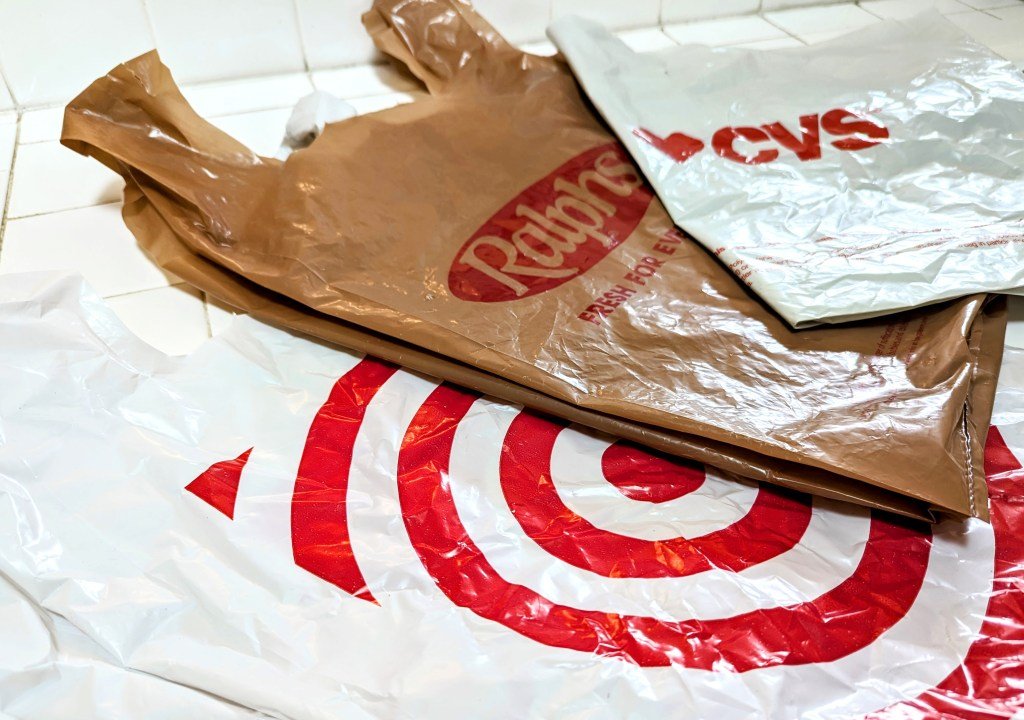Two bills under consideration in the California Assembly would ban supermarkets and retail stores from providing “reusable” plastic bags to shoppers.
More than 230,000 tons of plastic waste. That’s the weight of plastic bags Californians threw out in 2021.
With numbers like these, it’s clear that California’s plastic bag ban isn’t working as intended. Two bills pending in the state Legislature could change that, by truly banning plastic bags at grocery store checkouts.
Voters made it clear they didn’t want plastic bags in grocery stores when they approved Proposition 67 in 2016, confirming a statewide ban on single-use plastic shopping bags.
However, the plastics industry quickly exploited the law, inventing thick plastic bags that they claimed were exempt because they met the law’s definition of a reusable bag. In reality, most of these bags are not reused or recycled across the state.
Plastic bags are typically used for only a few minutes, and then thrown away after the short drive home from the grocery store. These bags are rarely recycled. Most or all of CalRecycle’s waste management centers do not accept plastic bags for recycling. The few bags that make it to specialized centers are not recycled into plastic bags, but are “downcycled” into other products, such as plastic park benches. This process does not address the root of the problem: reducing the number of plastic bags made each year.
Globally, we dump two garbage trucks’ worth of plastic into the ocean every minute. Plastic bags are the most common type of plastic waste that marine animals, including endangered Pacific leatherback turtles, whales, and dolphins, eat or become entangled in. As this plastic breaks down, it doesn’t disappear. Instead, it breaks down into tiny pieces called microplastics. Microplastics have been found almost everywhere, from the top of Mount Everest to the bottom of the Mariana Trench and even inside our bodies.
Plastic bags cannot be recycled, so billions of new bags are made every year. Plastic is primarily made from fossil fuels, so to produce more plastic bags, we need to drill for more oil, gas, and coal. Extracting and refining fossil fuels releases toxic substances, including known carcinogens and neurotoxins, into the air, contributing to climate change. In 2019, plastic produced 1.8 billion tonnes of greenhouse gas emissions.
Plastic bags impose huge waste management costs. Each year, Californians pay nearly $420 million to keep plastic from littering our oceans, beaches and waterways, plus an additional $6.7 million in road sweeping and manual land-based trash cleanup. Fixing the state’s bag ban is both an environmental imperative and an economic good practice.
Californians know how harmful plastic bags are, which is why the state banned them in 2014 and voters put the law on the ballot in 2016.
Two bills currently moving through the state legislature could finally give Californians the outcome they’ve been hoping for: plastic bag-free grocery stores. If passed, SB 1053 from State Senator Katherine Breakspear and AB 2236 from State Assembly Member Rebecca Bauer Kahan would ban grocery store cashiers from offering plastic bags and change the definition of “reusable bag” so that plastic film bags are no longer considered “reusable.”
This bill would finally eliminate plastic bags from grocery stores. The goal is to encourage people to shop with their own reusable bags and use them multiple times. If you forget your bag, a paper bag will be provided for a small fee. Unlike plastic bags, paper bags can be recycled statewide and are also compostable.
As California is the most populous state in the U.S., reducing plastic bags will significantly reduce plastic waste entering the environment and reduce the need to manufacture more plastic. It’s time to pass SB 1053 and AB 2236 and phase out single-use plastic shopping bags for good.
Laura Deehan is the state representative for Environment California and lives in Richmond, and Fiona Hines is a legislative activist for CALPIRG.

